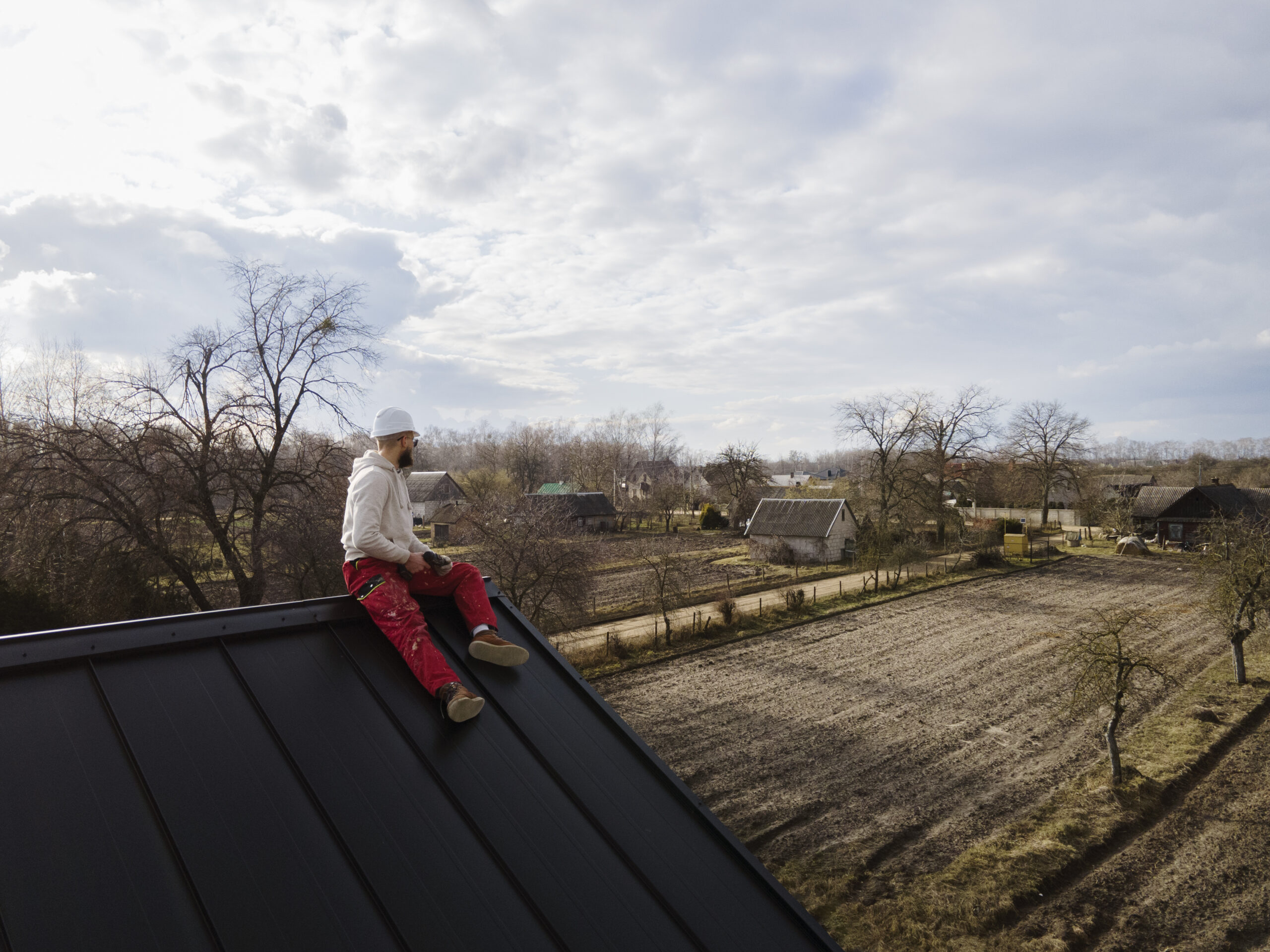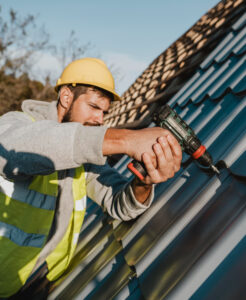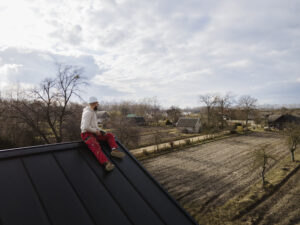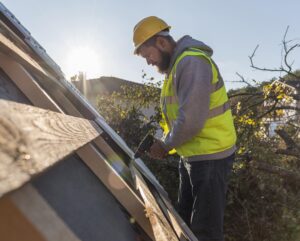St. Petersburg, FL Roofing: Your Expert Guide

Quick Summary / Key Takeaways
If you only remember 5 things from this guide, make it these:
- Selecting the right roofing material is crucial due to Florida’s intense sun and hurricane season.
- Regular roof inspections can prevent costly repairs and extend the lifespan of your roof in St. Petersburg.
- Understanding local building codes and permit requirements is essential for any roofing project in the city.
- Hiring a licensed and insured roofing contractor protects you from liability and ensures quality workmanship.
- Investing in energy-efficient roofing can significantly lower your cooling costs in St. Petersburg’s hot climate.
Common Roofing Material Metrics in St. Petersburg
| Material | Lifespan | Cost (per sq ft) | Wind Resistance |
| Asphalt Shingles | 15-20 years | $3-5 | Up to 130 mph |
| Tile Roofing | 50+ years | $10-20 | Up to 150 mph |
| Metal Roofing | 40-70 years | $9-16 | Up to 140 mph |
| TPO Roofing | 20-30 years | $5-8 | Up to 160 mph |
Roofing Features Comparison
| Feature | Asphalt | Tile | Metal |
| Cost | Low | High | Medium |
| Durability | Moderate | High | High |
| Weight | Medium | Heavy | Light |
| Energy Efficiency | Low to Medium | High | High |
Launch Checklist
- Research local St. Petersburg roofing contractors.
- Obtain multiple quotes for your roofing project.
- Verify contractor’s license and insurance.
- Review contractor’s past projects and references.
- Secure necessary permits from the city of St. Petersburg.
- Establish a clear contract with the roofing contractor.
Introduction
St. Petersburg, Florida, presents unique roofing challenges due to its climate. From intense sun exposure to hurricane-force winds, your roof needs to withstand a lot. This guide provides homeowners with the knowledge to make informed decisions about roofing in St. Pete. Understanding the different materials, local regulations, and maintenance practices can save you money and protect your home. We will explain local roofing project experts so you can make the right choice.
Choosing the right roofing contractor is also a critical step. A reputable contractor will ensure the job is done correctly, adheres to local codes, and protects your investment. Neglecting these factors can lead to premature roof failure and costly repairs. Let’s dive into the specifics of roofing in St. Petersburg, FL.
Table of Contents
SECTION 1: UNDERSTANDING ROOFING MATERIALS
SECTION 2: HIRING A ROOFING CONTRACTOR
SECTION 3: ROOF MAINTENANCE AND INSPECTIONS
Frequently Asked Questions
Section 1: Understanding Roofing Materials
FAQ 1: What are the most common roofing materials used in St. Petersburg, FL?
Asphalt shingles, tile, and metal are the most common roofing materials in St. Petersburg, FL, due to their varying levels of durability and cost-effectiveness. Asphalt shingles are popular for their affordability, while tile offers superior longevity and aesthetic appeal. Metal roofing is known for its durability and energy efficiency, making it a solid choice for Florida’s climate. Each material has pros and cons depending on budget and desired lifespan. Consider your specific needs when selecting a roofing material.
Real Results: A homeowner in St. Pete switched to metal roofing and saw a 20% decrease in their energy bills during the summer months.
Takeaway:
Choose a roofing material that balances cost, durability, and energy efficiency for the St. Petersburg climate.
FAQ 2: What are the pros and cons of asphalt shingles?
Asphalt shingles are affordable and easy to install, but they have a shorter lifespan compared to other roofing materials. Their low upfront cost makes them a popular choice for budget-conscious homeowners. However, they are susceptible to damage from high winds and intense sun exposure. Roofing contractor selection is key to ensuring proper installation. Asphalt shingles typically last 15-20 years in Florida’s climate, requiring more frequent replacement.
Real Results: A homeowner saved $5,000 on initial installation costs by choosing asphalt shingles over tile roofing.
Takeaway:
Asphalt shingles offer affordability but require more frequent replacement due to their shorter lifespan.
FAQ 3: How durable is tile roofing in Florida’s climate?
Tile roofing is exceptionally durable in Florida’s climate, known to withstand high winds, intense sun, and even hail. Its resistance to decay and insect damage makes it a long-lasting option for St. Petersburg homes. Tile roofing can last 50+ years with proper maintenance. This longevity often offsets the higher initial cost. However, the weight of tile may require additional structural support.
Real Results: A home with tile roofing survived Hurricane Irma with minimal damage, while neighboring homes with asphalt shingles suffered significant losses.
Takeaway:
Tile roofing offers superior durability and longevity, making it a worthwhile investment for Florida homeowners.
FAQ 4: What are the benefits of metal roofing for St. Petersburg homes?
Metal roofing provides excellent durability, energy efficiency, and wind resistance, making it an ideal choice for St. Petersburg homes. Its reflective properties help reduce cooling costs during the hot summer months. Metal roofs can withstand winds up to 140 mph and last 40-70 years. Though the initial cost is higher than asphalt, its long lifespan and energy savings can make it a cost-effective choice. It’s also a more sustainable option, as it is recyclable.
Real Results: A homeowner with a metal roof reported a 30% reduction in their summer cooling bills, saving them hundreds of dollars annually.
Takeaway:
Metal roofing offers durability, energy efficiency, and wind resistance, making it a smart choice for St. Petersburg homeowners.
FAQ 5: Is TPO roofing a good option for flat roofs in St. Pete?
TPO roofing is a good option for flat roofs in St. Petersburg because of its heat-reflective properties and resistance to UV damage. It’s a single-ply membrane that’s durable and energy-efficient, helping to keep buildings cool. TPO is also relatively lightweight and cost-effective compared to other flat roofing materials. It is also resistant to mold growth, tears and punctures. Proper installation is key to preventing leaks and ensuring longevity.
Real Results: A business owner with a TPO roof saw a 15% decrease in cooling costs after installation, improving their bottom line.
Takeaway:
TPO roofing is a cost-effective and energy-efficient option for flat roofs in St. Petersburg, offering good UV resistance and durability.
FAQ 6: How does the cost of different roofing materials compare?
The cost of roofing materials varies significantly, with asphalt shingles being the least expensive and tile roofing the most. Asphalt shingles typically cost $3-5 per square foot, while tile can range from $10-20 per square foot. Metal roofing falls in between, costing around $9-16 per square foot. Material cost differences reflect durability and lifespan. Consider long-term value and maintenance costs when comparing materials.
Real Results: A homeowner chose asphalt shingles for a new roof, saving $7,000 compared to the cost of tile roofing.
Takeaway:
Compare the cost of different roofing materials, considering both upfront expenses and long-term value.
FAQ 7: What is the lifespan of different roofing materials in Florida?
The lifespan of roofing materials in Florida varies depending on the material’s durability and resistance to the elements. Asphalt shingles typically last 15-20 years, while tile roofing can last 50+ years. Metal roofing offers a lifespan of 40-70 years, and TPO roofing lasts 20-30 years. Regular maintenance and proper installation can extend the lifespan of any roofing material. Consider the long-term investment when choosing a roofing material.
Real Results: A homeowner with a well-maintained tile roof has had it for over 60 years without needing replacement.
Takeaway:
Choose a roofing material with a lifespan that aligns with your long-term needs and budget.
FAQ 8: Which roofing material offers the best wind resistance?
Metal and tile roofing generally offer the best wind resistance, capable of withstanding winds up to 140-150 mph. TPO roofing can also offer high wind resistance depending on the installation method. Asphalt shingles typically offer lower wind resistance, up to 130 mph. In hurricane-prone areas like St. Petersburg, wind resistance is a crucial factor. Consider your location and potential wind exposure when selecting a roofing material.
Real Results: A home with a metal roof survived a hurricane with minimal damage, while homes with asphalt shingles experienced significant blow-off.
Takeaway:
Prioritize wind resistance when selecting a roofing material in hurricane-prone areas like St. Petersburg.
Section 2: Hiring a Roofing Contractor
FAQ 9: How do I find a reputable roofing contractor in St. Petersburg?
Finding a reputable roofing contractor in St. Petersburg involves research, verification, and careful consideration of their experience and credentials. Start by asking for recommendations from friends, family, or neighbors. Check online review sites like Google, Yelp, and the Better Business Bureau. Verify the contractor’s license and insurance. Look for contractors with years of experience and positive reviews.
Real Results: A homeowner found a reputable contractor through a referral from a trusted friend, resulting in a smooth and successful roofing project.
Takeaway:
Research, verify credentials, and seek recommendations to find a reputable roofing contractor in St. Petersburg.
FAQ 10: What questions should I ask a roofing contractor before hiring them?
Before hiring a roofing contractor, ask about their experience, licensing, insurance, warranty, and payment terms. Inquire about the materials they use and their installation process. Ask for references from past clients. Clarify who will be responsible for obtaining permits. Understand their process for handling unexpected issues or damage. Getting clear answers will help you make an informed decision.
Real Results: A homeowner asked detailed questions and uncovered that a contractor wasn’t properly licensed, avoiding a potential disaster.
Takeaway:
Ask detailed questions about experience, licensing, insurance, and warranty before hiring a roofing contractor.
FAQ 11: Why is it important to hire a licensed and insured contractor?
Hiring a licensed and insured contractor protects you from liability and ensures quality workmanship. A licensed contractor has met the state’s requirements and demonstrated competency. Insurance protects you if a worker is injured on your property or if there is damage to your home. An unlicensed or uninsured contractor puts you at risk for financial and legal issues. Always verify the contractor’s credentials before hiring.
Real Results: A homeowner hired an unlicensed contractor, and when a worker was injured, the homeowner was held liable for medical expenses.
Takeaway:
Protect yourself by hiring a licensed and insured roofing contractor to ensure quality work and avoid liability.
FAQ 12: How can I verify a contractor’s license in Florida?
You can verify a contractor’s license in Florida through the Florida Department of Business and Professional Regulation (DBPR) website. Search for the contractor’s name or license number to confirm their status. The DBPR website provides information on any disciplinary actions or complaints against the contractor. Always verify the license is active and in good standing before hiring a contractor. This step is essential for protecting your investment.
Real Results: A homeowner verified a contractor’s license and discovered it had expired, prompting them to choose a different contractor.
Takeaway:
Verify a contractor’s license through the Florida DBPR website to ensure they are properly licensed and in good standing.
FAQ 13: What should be included in a roofing contract?
A roofing contract should include a detailed scope of work, materials to be used, project timeline, payment schedule, and warranty information. It should also specify who is responsible for obtaining permits and handling any unexpected issues. The contract should include the contractor’s license number and insurance information. Review the contract carefully and ensure you understand all terms before signing. A clear contract protects both you and the contractor.
Real Results: A homeowner had a detailed contract that clearly outlined the scope of work, preventing disputes and ensuring the project was completed as agreed.
Takeaway:
Ensure your roofing contract includes a detailed scope of work, materials, timeline, payment schedule, and warranty information.
FAQ 14: How many estimates should I get before hiring a contractor?
It’s recommended to get at least three estimates from different roofing contractors before making a decision. This allows you to compare pricing, materials, and services offered. Review each estimate carefully and ask questions about any discrepancies. Getting multiple estimates helps you ensure you are getting a fair price and the best value for your money. Don’t base your decision solely on price; consider the contractor’s reputation and experience.
Real Results: A homeowner obtained three estimates and saved $2,000 by choosing the contractor with the most competitive pricing and best reviews.
Takeaway:
Obtain at least three estimates from different contractors to compare pricing, materials, and services.
FAQ 15: What is the typical warranty offered by roofing contractors?
Roofing contractors typically offer two types of warranties: a workmanship warranty and a manufacturer’s warranty. A workmanship warranty covers defects in the installation process, while a manufacturer’s warranty covers defects in the roofing materials. The length of the warranty varies depending on the contractor and the materials used. Make sure to get a clear understanding of the warranty terms before hiring a contractor. A solid warranty protects you from future issues.
Real Results: A homeowner had a faulty installation covered under the contractor’s workmanship warranty, saving them thousands in repair costs.
Takeaway:
Understand the terms of both the workmanship and manufacturer’s warranties before hiring a roofing contractor.
FAQ 16: How do I handle disputes with a roofing contractor?
If you have a dispute with a roofing contractor, first try to resolve it through direct communication. Document all communication and keep records of any agreements. If you can’t resolve the issue, consider mediation or arbitration. You can also file a complaint with the Florida Department of Business and Professional Regulation. As a last resort, you may need to pursue legal action. It is important to document everything.
Real Results: A homeowner resolved a dispute through mediation, avoiding a costly legal battle and reaching a mutually agreeable solution.
Takeaway:
Attempt to resolve disputes through communication, and document all interactions with the roofing contractor.
Section 3: Roof Maintenance and Inspections
FAQ 17: How often should I inspect my roof in St. Petersburg?
You should inspect your roof at least twice a year, ideally in the spring and fall, and after any major storms. Regular inspections can help identify potential problems early before they become major issues. Look for signs of damage, such as missing shingles, cracks, or leaks. If you’re not comfortable inspecting your roof yourself, hire a professional. Early detection can save you money on costly repairs.
Real Results: A homeowner who inspected their roof regularly caught a small leak early, preventing significant water damage to their home.
Takeaway:
Inspect your roof at least twice a year and after major storms to identify and address potential problems early.
FAQ 18: What are the signs of roof damage I should look for?
Signs of roof damage include missing, cracked, or curling shingles, granules in the gutters, leaks in the attic, and water stains on ceilings. Also look for sagging or discoloration on the roof surface. Check for moss or algae growth, which can trap moisture and damage the roof. If you notice any of these signs, contact a professional roofing contractor for an inspection. Ignoring these signs can lead to more serious problems.
Real Results: A homeowner noticed granules in their gutters and discovered they had significant shingle damage, preventing further water damage.
Takeaway:
Look for missing shingles, leaks, water stains, and other signs of damage during roof inspections.
FAQ 19: How do I clean my roof safely?
Cleaning your roof safely involves using the right tools and techniques to avoid damaging the roofing materials.
Use a soft-bristled brush and a garden hose with a low-pressure nozzle. Avoid using a pressure washer, as it can damage shingles. Start at the top of the roof and work your way down. Wear slip-resistant shoes and use a safety harness if necessary. If you’re not comfortable cleaning your roof yourself, hire a professional cleaning service.
Real Results: A homeowner cleaned their roof using a soft brush and low-pressure hose, removing algae and preventing further damage.
Takeaway:
Use a soft brush and low-pressure hose to clean your roof safely, avoiding harsh chemicals and pressure washers.
FAQ 20: How can I prevent moss and algae growth on my roof?
Preventing moss and algae growth involves keeping your roof clean and free of debris. Trim trees and branches that overhang the roof to allow more sunlight and air circulation. Install zinc or copper strips near the ridge of the roof to inhibit growth. You can also apply a roof cleaning solution specifically designed to kill moss and algae. Regular cleaning and maintenance can prevent these issues from recurring.
Real Results: A homeowner installed zinc strips on their roof and successfully prevented moss and algae growth for several years.
Takeaway:
Trim trees, install zinc strips, and apply roof cleaning solutions to prevent moss and algae growth.
FAQ 21: Should I hire a professional for roof maintenance?
Hiring a professional for roof maintenance is recommended for safety and to ensure a thorough inspection and cleaning. Professionals have the experience and equipment to identify and address potential issues effectively. They can also perform repairs and maintenance tasks safely and efficiently. While DIY maintenance can save money, it’s best to leave more complex tasks to the professionals. Consider the cost and benefits when deciding.
Real Results: A homeowner hired a professional for roof maintenance and discovered a hidden leak, preventing significant water damage.
Takeaway:
Consider hiring a professional for roof maintenance to ensure safety and a thorough inspection and cleaning.
FAQ 22: What is the cost of a roof inspection in St. Petersburg?
The cost of a roof inspection in St. Petersburg typically ranges from $100 to $300, depending on the size and complexity of the roof. Some contractors offer free inspections as part of their service. It’s a worthwhile investment to identify potential problems early. Get quotes from several inspectors before hiring. The cost of an inspection is minimal compared to the cost of major repairs.
Real Results: A homeowner paid $150 for a roof inspection and discovered a minor issue that prevented a $5,000 repair later.
Takeaway:
Expect to pay $100-$300 for a roof inspection in St. Petersburg, and consider it a worthwhile investment.
FAQ 23: How do I find a good roof inspector?
Finding a good roof inspector involves checking their credentials, experience, and reputation. Look for inspectors who are certified by organizations like the National Roofing Contractors Association (NRCA). Read online reviews and ask for referrals. Ensure the inspector is thorough and provides a detailed report. A good inspector can help you make informed decisions about your roof.
Real Results: A homeowner found a certified roof inspector who provided a detailed report, helping them make informed decisions about repairs.
Takeaway:
Check credentials, read reviews, and ask for referrals to find a good roof inspector in St. Petersburg.
FAQ 24: How does weather impact roof maintenance?
Weather significantly impacts roof maintenance, requiring different approaches depending on the season.
During hurricane season, inspect your roof before and after storms. In the summer, protect your roof from intense sun exposure. In the winter, check for ice dams and water damage. Regular maintenance tailored to the weather conditions can extend the lifespan of your roof. Be proactive with seasonal maintenance.
Real Results: A homeowner prepared their roof for hurricane season and avoided damage during a major storm.
Takeaway:
Tailor your roof maintenance to the weather conditions, inspecting and preparing your roof for each season.
Recent Post

Roof Replacement Tampa: Your Complete Guide to a Secure Home

St. Petersburg, FL Roofing: Your Expert Guide





